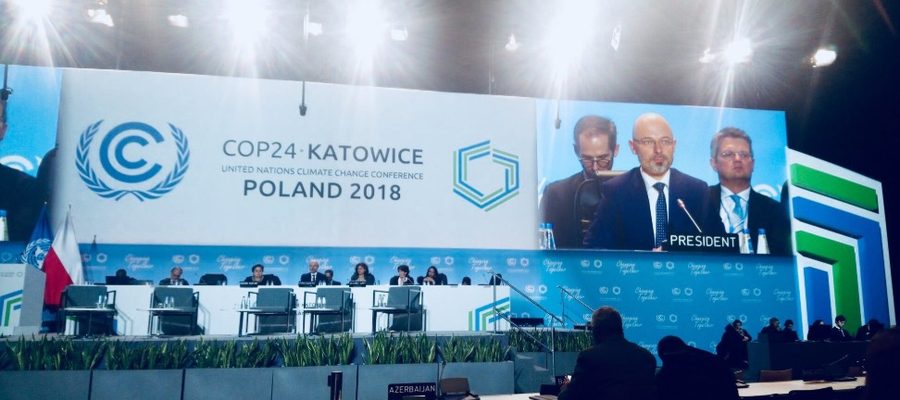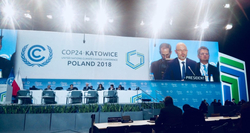Decoding Katowice Climate Package: What it Means for South Asia

The 24th Conference of the Parties (COP24) to the UN Framework Convention on Climate Change (UNFCCC) recognised the imperatives for rapid, sustained, ambitious and far reaching climate action, and encouraged nations to aim for restricting temperature rise by 2100 to 1.5 deg. C above pre-industrial levels.
Amid calls for deep decarbonisation pathways, nations delivered on the universally acceptable “rulebook” for operationalisation of the Paris Agreement. The two-week long COP24 witnessed attendance of more than 22,000 participants from governments, UN bodies and agencies, intergovernmental organisations, civil society organisations and media.
The main outcome of the COP24 was consensus on and adoption of the Paris Agreement Work Programme (PAWP), which is also known as the Paris “rulebook”. The rulebook provides guidance and facilitates implementation of the Paris Agreement post 2020. The other two key issues discussed during this conference were the culmination of the year-long facilitative dialogue process called ‘Talanoa Dialogue’ and the stocktake of pre-2020 commitments.
 Photo courtesy: IISD
Photo courtesy: IISD
The COP24 concluded on the 15th of December 2018, a day later than expected, with the adoption of the ‘Katowice Climate Package’. A detailed rulebook was finalised which defines nations’ responsibilities for implementing the Paris Agreement, reporting their progress and enhancing their efforts in future. The Katowice Climate Package has prepared the ground for countries to move forward and operationalise the Paris Agreement.
While certain technical specifics, such as rules for voluntary carbon markets as stipulated in Article 6, will be discussed further at COP25 in Chile, the crucial components for undertaking multilateral climate action have been defined in the Climate Package. Key guidance on several aspects of implementation of the Paris Agreement is included in the Katowice Climate Package:
• Transparency Framework guidelines defines the process for preparation and submission of first biennial transparency report and national inventory report. The biennial transparency report would include national inventory report of anthropogenic GHG emissions, information to track progress in implementing and achieving NDC, climate change impacts and adaptation and information on financial, technology transfer and capacity-building support needed and received. The transparency framework also provides flexibility to countries in light of national circumstances and capacities.
• The guidance on adaptation acknowledges the importance of flexibility in communication, which is provided to countries by Article 7 of the Paris Agreement. The package clearly indicates that adaptation communication is a country-driven and flexible process, including the choice of communication, thereby recognising the principles of equity and Common but Differentiated Responsibilities and Respective Capabilities (CBDR-RC). The Katowice Climate Package also encourages continuous and enhanced international support to developing countries for implementation of adaptation activities.
• The Katowice Climate Package has delineated the structure of the Global Stocktake Process scheduled in 2023 for first cycle of NDCs. The GST process structure would consist of 3 stages i.e. Information collection, technical assessment and consideration of outputs. The GST guideline also recognises that it would be a party driven and cross cutting process that will consider equity and the best available science.
• The Package recognises the importance of predictability and clarity of information on financial support for the implementation of the Paris Agreement. The Package also intends to convene a biennial high-level ministerial dialogue on climate finance beginning in 2021. Countries have also agreed to initiate work on setting up new collective finance goals post-2020, from the floor of USD 100 billion.
• Guidelines on how to evaluate advancement on the progress of technology transfer are included.
• The Katowice Climate Package emphasises enhanced pre-2020 ambition and acknowledged that it can lay a solid foundation for higher post-2020 ambitions.

Photo courtesy: IISD
Talanoa Dialogue and Pre-2020 Commitments
Besides negotiations on PAWP, the other two key issues discussed were the Talanoa Dialogue process and outcomes and the means to raise collective ambition, before the next round of NDC submission in 2020. The Talanoa Dialogue, earlier named facilitative dialogue, was a process of taking stock of progress on climate action to date at COP24. A year-long Talanoa Dialogue process initiated in 2017 encouraged parties as well as non-stakeholders to discuss the domestic climate action status and how it can be enhanced by 2020. The final text of the Katowice Climate Package, takes note of the outcome, inputs and outputs of the Talanoa Dialogue and invites countries to consider the outcomes of the Talanoa Dialogue in preparing their NDCs and in their efforts to enhance pre-2020 implementation and ambition.
This formal acknowledgment of Talanoa Dialogue process clearly signals an opportunity for delivering the NDCs and raise national and global ambitions by 2020 through multi-level climate action.
As a focal point for Local Governments and Municipal Authorities (LGMA) constituency to UNFCCC, ICLEI supported the Talanoa Dialogue process. With support from Global Taskforce, ICLEI engaged in worldwide conversation on multi-level, multi-stakeholder climate action through the Cities and Regions Talanoa Dialogues in more than 60 Cities and Regions across 37 countries over the course of 2018. The outcomes of these consultations were subsequently submitted to UNFCCC.
Climate Leadership by Local and Regional Governments at COP24
From the local and regional government perspective, COP24 was notable because of the scale of involvement of local governments and multi-level policy makers. On the sidelines of COP24 negotiations, local and regional leaders also showcased their climate leadership by pledging for faster climate action. The recognition of an official day for the Global Covenant of Mayors for Climate & Energy, active participation of local and regional leaders at the Ministerial Talanoa Dialogues and inclusion of the ‘NDC Partnership Pavillion,’ during COP24 clearly signalled the opportunity and significance of multi-level climate action in achieving NDCs. (For more information, see here).
All through COP24, ICLEI South Asia played a key role in promoting multi-level climate action at various government and non-government platforms. Climate action by various sub-national actors in India, who are already working on integrating climate and urban planning in their respective cities and are keen to collaborate with national and global stakeholders to enhance their efforts, was showcased. ICLEI South Asia partnered with key ministries/departments from India to highlight the opportunities and benefits of multi-level climate action through side events at the India pavilion.
ICLEI was also able to share the outcomes of Talanoa Dialogue consultations from India and Bangladesh (For more information, see here) with various government and non-government entities, bringing to the forefront the significance of sub-national action to raise climate ambition. ICLEI South Asia also facilitated knowledge sharing and highlighted the scope for collaborative action among developing countries for implementation of the NDCs in a side event with the Government of Vietnam and NDC-Partnership.
Amidst the success of COP24 presidency in achieving the ‘Katowice Climate Package’ and commitments by local and regional governments to enhance action on climate change, the road to COP25 in Chile is full of hope and positive momentum for multi-level climate action.




